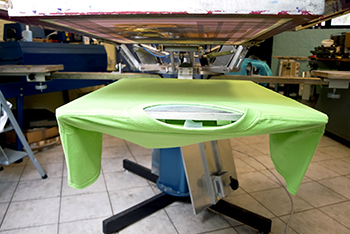 Sept. 15, 2014 – A business called “Sconnie Nation” used a photo of Madison Mayor Paul Soglin to sell T-shirts at the famous (or infamous) Mifflin Street Block Party. Recently, the U.S. Court of Appeals for the Seventh Circuit said that was okay.
Sept. 15, 2014 – A business called “Sconnie Nation” used a photo of Madison Mayor Paul Soglin to sell T-shirts at the famous (or infamous) Mifflin Street Block Party. Recently, the U.S. Court of Appeals for the Seventh Circuit said that was okay.
Photographer Michael Kienitz took the original photo at Soglin’s 2011 inauguration. Sconnie Nation obtained the photo on the City of Madison’s website, transformed the photo and put a slogan on it – “Sorry for Partying” – and sold 54 of the Soglin T-shirts.
In the opinion in Kienitz v. Sconnie Nation LLC, No. 13-3004 (Sept. 15, 2014), the three-judge panel notes that Soglin’s face was the subject of the t-shirt because Soglin wanted to shut down the event, despite attending the first block party in 1969.
The opinion by Judge Frank Easterbrook also includes a comparison of the original photo and the altered photo on the T-shirt. A federal district court had granted summary judgment to Sconnie Nation based on fair use, and Kienitz appealed.
But the three-judge appeals court panel affirmed the lower court’s ruling, concluding that Sconnie Nation’s use of the photo did not infringe the federal Copyright Act.
Under the Act, courts consider a number of factors in deciding “fair use,” including “the amount and substantiality of the portion used in relation to the copyrighted work” and the “effect of the use upon the potential market for or value of the copyrighted work.”
The appeals court panel said Sconnie Nation did not use much of the original photo, noting the background is gone and the colors and shading were gone.
“What is left, besides a hint of Soglin’s smile, is the outline of his face, which can’t be copyrighted,” Judge Easterbrook wrote.
As to the effect of the use on the potential market for or value of the photo, the court noted that the use may hurt Kienitz’s long-range commercial opportunities.
“Fewer people will hire or cooperate with Kienitz if they think the high quality of his work will make the photos more effective when used against them!" Easterbrook quipped.
“But Kienitz does not present an argument along these lines, and the consideration in the preceding paragraph is not enough to offset the fact that, by the time defendants were done, almost none of the copyrighted work remained,” Easterbrook concluded.
